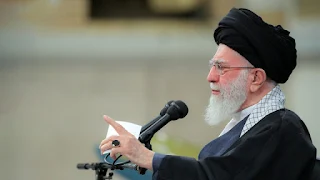The judiciary in Iran announced that Iranian Supreme Leader Ali Khamenei agreed to pardon and commute the sentences issued against 2,127 convicts, on the occasion of the Iranian New Year and Eid al-Fitr.
The head of the judiciary proposed, in a letter to the Iranian Leader, that “the sentences issued to two thousand one hundred and twenty-seven people who were convicted by the General and Revolutionary Courts, the Government Ta’zir Organization, and the Judicial Organization of the Armed Forces be pardoned or commuted,” and this proposal was approved.
For his part, the Deputy Head of the Iranian Judiciary, Hojjat al-Islam Sadiq Rahimi, explained the details of the pardon, saying: “At this stage, an amnesty was announced for 2,127 convicts who had the necessary conditions that qualify them to obtain a pardon.”
He added: "Of the total people who benefited from amnesty and commutation at this stage, 858 people were completely pardoned and their files were closed. As for the other convicts, amounting to 1,269 people, their sentences were approved to be commuted."
He added: "There were 29 people sentenced to death, but thanks to the pardon and commutation granted to them, their sentence was changed to imprisonment."
Rahimi continued, "Five of the people included in the amnesty were convicted under Article 20, and those sentenced under Article 20 are those who did not meet the initial conditions for amnesty, as the head of the judiciary requested their pardon."
The judicial representative concluded: “The amnesty issued included 156 convicted women, 5 convict foreigners, 11 convicts on security charges, and 5 people under the age of eighteen.”






مجرموں کے لیے خوش خبری
ReplyDeleteThe Iranian judiciary announced a pardon for 2,127 convicts, with 858 fully pardoned and 1,269 having their sentences commuted. Notably, 29 death sentences were converted to imprisonment, showing a significant gesture of clemency.
ReplyDeleteNice
ReplyDeleteGood
ReplyDelete
ReplyDeleteHome
afghan taliban
The leader of the Afghan Taliban issues a statement in 7 languages after an audio recording and flogging and stoning of women and men
April 07, 2024
The leader of the Afghan Taliban issues a statement in 7 languages after an audio recording and flogging and stoning of women and men
On Saturday, in a statement, the leader of the Afghan Taliban movement, Hibatullah Akhundzada, called on officials in the movement to put aside their differences and devote themselves to serving their country, as Eid al-Fitr approaches.
It seems that public opposition within the Taliban is unlikely, but some leaders in the movement have shown dissatisfaction with decisions taken by the leadership, especially the ban on female education.
Akhundzada, a reclusive leader who rarely leaves the Taliban stronghold in Kandahar province in the south of the country, and never appears in public, has played a major role in imposing restrictions on women and girls, sparking international outrage and isolating the Taliban on the global stage.
Akhundzada's message was distributed in seven languages, including Uzbek and Turkmen, and is an attempt by the Taliban to court the rich Central Asian countries for investment, and to give legitimacy to the country's rule.
Good
ReplyDeleteGood
ReplyDeleteGood 2
ReplyDeleteGood
ReplyDeleteRahimi continued, "Five of the people included in the amnesty were convicted under Article 20, and those sentenced under Article 20 are those who did not meet the initial conditions for amnesty, as the head of the judiciary requested their pardon
ReplyDeleteGood
ReplyDeleteGood
ReplyDeleteThe Iranian judiciary announced a pardon for 2,127 convicts, with 858 fully pardoned and 1,269 having their sentences commuted. Notably, 29 death sentences were converted to imprisonment, showing a significant gesture of clemency.
ReplyDeleteGood 👍
ReplyDeleteFor his part, the Deputy Head of the Iranian Judiciary, Hojjat al-Islam Sadiq Rahimi, explained the details of the pardon, saying: “At this stage, an amnesty was announced for 2,127 convicts who had the necessary conditions that qualify them to obtain a pardon.”
ReplyDeleteThe judicial representative concluded: “The amnesty issued included 156 convicted women, 5 convict foreigners, 11 convicts on security charges, and 5 people under the age of eighteen.
ReplyDeleteThe judicial representative concluded: “The amnesty issued included 156
ReplyDeletenian Supreme Leader Ali
ReplyDeleteGreat
ReplyDeleteGood
ReplyDeletethe Government Ta’zir Organization, and the Judicial Organization of the Armed Forces be pardoned or commuted,” and this proposal was approved.
ReplyDeleteNice
ReplyDeleteGood
ReplyDeleteGood
ReplyDeleteGood
ReplyDeleteGood
ReplyDeleteGood
ReplyDelete